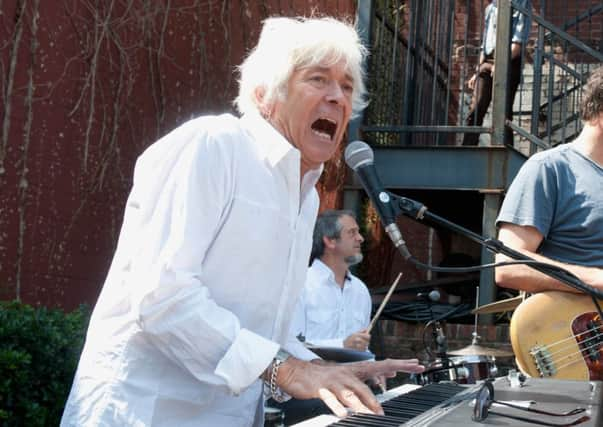Obituary: Ian McLagan, musician


Ian “Mac” McLagan was one of the most distinctive and well-known keyboard and organ players of the last half-century. He played as a member of and a session musician with numerous bands – for example the electric piano riff to Rolling Stones’ Miss You was one of his, although not always recognised widely as such – but it’s for his time with mid-60s mod rockers Small Faces and that band’s early-70s reincarnation the Faces that he was most well-known.
Born in Hounslow, Middlesex, McLagan would in later life recall how his mother had wanted him to learn classical piano, but that he had no interest and would indeed never learn to play scales. Instead, he developed an affection for the more contemporary sound of the Hammond organ, owning an L-102 model from an early age. It is still in the possession of Small Faces and Faces drummer Kenney Jones.
Advertisement
Hide AdAdvertisement
Hide AdUpon leaving school he studied art a short distance from his home at what was then Twickenham College of Technology (now known as Richmond upon Thames College, its other notable musical alumni include the Britpop era group Kula Shaker and contemporary indie-rocker Jamie T).
Around this time McLagan divided up his studies with playing music, and his late teens featured periods in his first band the Muleskinners as a keyboard player, a guitarist and briefly a singer. It was with this band that he first met the Rolling Stones, as a support act in the infancy of their career.
He would also play around the same time in the Boz People, the group fronted by future King Crimson and Bad Company member Boz Burrell, before being recruited in 1966 to be keyboard player with the Small Faces. Formed in London the year before by Jones, Steve Marriott, Ronnie Lane and Jimmy Winston, the group had already acquired a strong reputation for high-energy live gigs and a crisp-suited image which appealed to the Mod scene, although original organist Winston was reportedly disliked by the other members and seen as a musical weak link.
McLagan was recruited by the band’s infamous manager Don Arden (the father of Sharon Osbourne) following Winston’s dismissal, a perfect fit given his musical ability and the short stature which he would share with the rest of the band, hence their name.
He first played on their third single and first top ten hit Sha-La-La-La-Lee, and over the next three years of their existence on the seminal labels Decca and Immediate – the switch coincided with a break from Arden – he was an integral part of hits including the number one All Or Nothing, Itchycoo Park and Lazy Sunday, as well as the classic 1968 concept album Ogden’s Nut Gone Flake.
Despite their fame in the UK, however, and a modest top 20 US chart placing for Itchycoo Park, the group did not find success in America in the same manner as contemporaries the Who and the Jimi Hendrix Experience, thanks to McClagan’s petty drug offence record after he was caught with a small amount of cannabis resin by British customs on his way to Greece on holiday. The minor £50 fine would prevent the band from entering America, and this block on their ability to grow would be a contributory factor in Marriott’s decision to leave and form Humble Pie with Peter Frampton in 1969.
The three remaining Small Faces, however, landed on their feet with the addition of former Jeff Beck Group members Rod Stewart on vocals and Ronnie Wood on guitar.
McLagan first collaborated with the pair on Stewart’s debut solo record An Old Raincoat Won’t Ever Let You Down in 1969, and with permission now granted to enter the United States would go on to have a short but very successful time with the newly rechristened Faces (Stewart and Wood’s height were among the reasons for dropping the “Small”.
Advertisement
Hide AdAdvertisement
Hide AdThe 1971 third album A Nod Is As Good As a Wink… To a Blind Horse and 1973’s follow-up Ooh La La, as well as the respective lead singles Stay With Me and Cindy Incidentally, were significant hints on both sides of the Atlantic.
Following the Faces’ split in 1975, with Stewart devoting more time to his rocketing solo career, McLagan began a lengthy period as a well-regarded and in-demand guest session keyboard player, mostly working with the Hammond and Wurlitzer models.
Most famously in the years immediately after, he followed Wood into the Rolling Stones’ orbit – although not as a full member, unlike Wood – playing on Miss You and on concert tours between 1978 and 1981.
Over the years he would also work with Wood’s The New Barbarians, Bob Dylan, Bruce Springsteen and Chuck Berry, and was a member of Billy Bragg’s band The Blokes for a while, writing and performing on 2002’s England, Half English album. Most recently he played on Lucinda Williams’ 2014 double album Down Where the Spirit Meets the Bone.
Ironically, given his earlier troubles with US entry, McLagan ended up moving to America permanently in the late 1970s, on the advice of his manager. Having previously been married to dancer Sandy Sarjeant, he was in 1978 apparently told to marry his girlfriend Kim Kerrigan – former wife of the Who’s drummer Keith Moon – to assist in obtaining a green card.
McLagan would go on to describe her as the love of his life, and the couple remained together for 33 years, first in Los Angeles and then in the countryside around Austin, Texas, until her death in a car accident in 2006. Since 1995 the pair were naturalised US citizens.
Amidst his session work, McLagan played with his own Bump Band until his death, and in later life rumours of a Faces reunion grew stronger.
Ian McLagan died at home in Austin on 3 December from complications arising from a stroke suffered the previous day.